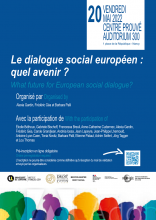Sans doute l’Union européenne est-elle à un tournant de son histoire. Au-delà même du contexte tragique lié au retour de la guerre à ses frontières, la construction européenne fait l’objet de critiques récurrentes qui n’ont fait que s’amplifier au cours des deux dernières décennies. Les uns lui imputent un déni de démocratie, sur fond d’asservissement à l’idéologie néolibérale, d’autres lui reprochent une incapacité à convaincre, à porter une ambition collective, c’est-à-dire une promesse, à travers de nouveaux récits. L’Europe serait ainsi face à une alternative : changer ou périr. Et face à un défi : se doter d’un nouveau telos. Refaire de l’Europe sociale – que beaucoup perçoivent comme un serpent de mer – une priorité, au prix le cas échéant de sa réinvention, constitue l’une des voies possibles. C’est à ce titre que la figure du dialogue social européen fait l’objet d’un regain d’intérêt, au moins dans les discours. Faut-il y voir un mirage, l’un des marqueurs d’une identité et/ou d’un modèle qui se cherche ? Cette figure incarne-t-elle aujourd’hui une promesse d’avenir pour l’Europe ?
Un tel questionnement invite à conjuguer un regard rétrospectif, sur ce qu’a été jusqu’à présent le dialogue social européen, avec un regard prospectif, en envisageant ce qu’il pourrait être – pour peu qu’on lui prête un devenir. D’abord, de quoi le dialogue social européen est-il le nom ? Là réside le point de départ de toute réflexion sur le sujet. Du « moment Delors » de la commission européenne à aujourd’hui, comment cette idée s’est-elle déployée ? Quelles traductions a-t-elle connues et qu’englobe-t-elle, en définitive ? Quelle appréciation porter sur ces concrétisations, au demeurant hétérogènes, résultant du rôle reconnu aux partenaires sociaux en matière de politique sociale, du dialogue social dit sectoriel ou des modes de participation des travailleurs au sein des entreprises et groupes de dimension communautaire ? Ces éclairages s’avèrent tout à fait indispensables pour appréhender la nécessité comme la possibilité même d’un renouveau du dialogue social européen ou de son renforcement – ce à quoi invitent, notamment, certains syndicats européens et le rapport de Madame Andrea Nahles publié il y a un peu plus d’un an (Report on strengthening EU social dialogue, European commission, fev. 2021). Quelles sont les dynamiques à l’œuvre ? A quels enjeux et défis le dialogue social européen est-il confronté ? Y a-t-il de bonnes raisons de croire au dialogue social européen ?
Voilà qui appelle une réflexion approfondie et lucide. Telle est l’ambition scientifique de cette journée, organisée au moment où la France s’engage dans la dernière phase de sa présidence du conseil de l’Union européenne, et dont le modus operandi consistera à croiser, en misant avant tout sur la discussion, des regards et points de vue experts.
A travers la question de l’avenir du dialogue social européen, c’est aussi celle du modèle social que l’Union européenne institue qui se trouve posée.
>> Pré-inscription en ligne obligatoire avant le 10 mai <<
L'inscription ne pourra être considérée comme définitive qu'à réception du mail de validation envoyé par les organisateurs.
***
The European Union is undoubtedly at a turning point in its history. Even beyond the tragic context of the war on its borders, the European construction has been subject to persistent criticism, which has only increased over the last two decades. Some accuse it of a lack of democracy, against a backdrop of subservientness to neo-liberal ideology, while others blame it for an inability to convince, to carry a collective ambition or to fulfill its promises through new narratives. Europe is thus faced with an alternative: change or perish. And faced with this alternative: to provide itself with a new telos. Making social Europe - which many perceive as a sea snake - a priority again, at the cost, if necessary, of its reinvention, is one of the possible ways forward. It is under this respect that the figure of the European social dialogue is gaining interest again, at least in the official discourse. Should we see the European social dialogue as an illusionary figure, or as a sign of an identity and/or a model that is still being pursued? Does this figure embody today a promise for the future of Europe?
Such a question invites us to combine a retrospective view of what the European social dialogue has been so far with a prospective view of what it could be - provided we give it a future. Firstly, what does the European social dialogue stand for? This is the starting point for any consideration on this topic. From the European Commission's "Delors moment" to the present day, how has this idea developed? What are realistically its achievements and what does it ultimately encompass? What assessment can we draw of the various ways in which this idea has been put into practice, resulting from the social partners' action in the field of social policy, from the so-called sectoral social dialogue or from worker participation within companies and groups of European dimension? These insights are essential to understand the need for, and the very possibility of, a renewal of the European social dialogue or its reinforcement - which is what some European trade unions and the report by Ms. Andrea Nahles published just over a year ago (Report on strengthening EU social dialogue, European Commission, February 2021)- are calling for. What are the dynamics at work? What are the stakes and challenges that the European social dialogue is currently facing? Are there any good reasons to believe in the European social dialogue?
This perspective calls for an in-depth and unbiassed discussion. This is also the scientific ambition of this conference, organized at a moment when France is embarking on the last phase of its presidency of the Council of the European Union, and whose modus operandi will consist in crossing and exchanging expert views by putting an emphasis on discussion.
There is no doubt that through the future of the European social dialogue, what is under discussion is actually the European social model.

